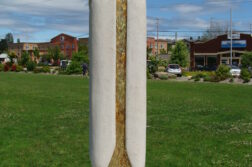Dorothy Healey’s CP Tenure
To the Editor,
I very much enjoyed reading the recent G&LR Pride Issue: Radical Pursuits [May-June 2022). I especially appreciated the way that the discussion was framed in the editor’s introduction. In that issue, I read with great interest Martin Duberman’s article on the historical relationship of the American Communist and Socialist parties to homosexuality and the LGBT+ movement. As always, Duberman sheds a discerning light on a fascinating topic.
There is, however, one minor error in Duberman’s description of Communist Party leader Dorothy Healey. I knew Dorothy starting in the early 1970s, and I made a documentary about her in the 1980s titled Dorothy Healey: An American Red (available on YouTube). Duberman’s article asserted that Dorothy left the CP in 1968 following the Soviet invasion of Czechoslovakia. Actually, while she did resign from leadership in 1968, she did not leave the Party until 1973. Her reasons for leaving the CP were many, but her key reason was the lack of democratic process within the Party.
As Duberman correctly noted, Dorothy left the CP but remained a committed leftist her entire life. In a public statement about her CP resignation on her KPFK radio program, she said: “My hatred of capitalism, which degrades and debases all humans, is as intense now as it was when I joined the Young Communist League in 1928. I remain a communist … albeit without a party.”
Eve Goldberg, Santa Rosa, CA
Lynes Missed That Dinner Party
To the Editor:
In Joseph M. Ortiz’ review of Allen Ellenzweig’s George Platt Lynes [March-April 2022], he makes a slight error concerning an important gathering in New York in 1949 at which several literary titans of the 20th century converged. He describes a dinner party hosted by publisher Monroe Wheeler and his partner, writer Glenway Wescott, whose guests included novelist E. M. Forster, his lover Bob Buckingham, and sexologist Alfred Kinsey. Ortiz may have inferred from the following sentence in the book (page 427) that Lynes stayed for dinner: “When Monroe invited George and [his mother]Adelaide Lynes to pre-dinner cocktails so they might meet E. M. Forster in the company of Dr. Alfred C. Kinsey…” However, he did not stay, and Ellenzweig does not state that he did so.
Forster biographer Wendy Moffat put it this way: “It was a disarming idea to start with George, like an amuse-bouche. He lingered just long enough to persuade [Forster and his married lover Bob Buckingham] to have their portraits taken the following week at his studio. Then the Lyneses evaporated.” As Moffat also reported, Wescott wrote in an October 10, 1971, New York Times article titled “A Dinner, a Talk, a Walk with Forster” that the fourth dinner guest (in addition to Forster, Buckingham, and Kinsey) was “old friend of his and mine, Joseph Campbell, the Sanskrit scholar, who has both professed and written about comparative mythology.” He did not mention Lynes and his mother having been there for cocktails.
As one would expect only two years after Stonewall, Wescott described Wheeler only as “my best friend” and Buckingham as Forster’s “friend of long standing, Robert Buckingham, a big, boyish man, a police officer, who (with his wife May) provided a family life when Forster wanted it in his later years.” For those unaware, Buckingham and his wife (who sometimes claimed she didn’t know of her husband’s sexual relationship with Forster) named their son after Forster, as did another of his lovers.
Michael Bedwell, Terre Haute, IN
Peter Tatchell and Parliament
To the Editor:
Regarding your introductory statement about British activist Peter Tatchell [“From the Editor,” May-June 2022 issue], a small clarification is in order. Tatchell has never served in Parliament. He ran as a Labour candidate in a safe Labour seat in 1983 but lost dramatically after a concerted anti-gay campaign against him was mounted.
I was living in London at the time and remember that campaign vividly. The attacks on Tatchell were vicious—and effective.
Gregg Blachford, Montréal, Québec
Virginia and Vanessa Stephen
To the Editor:
In a review of The Annotated Mrs. Dalloway [March-April 2002], Vanessa Bell is identified as Virginia Woolf’s “friend.” Bell was actually Woolf’s older sister. Virginia and Vanessa were both daughters of Leslie Stephen and Julia Prinsep Jackson; Woolf and Bell were their married names. By the way, while Woolf’s importance as a novelist is universally acknowledged, few people are aware that Bell was an accomplished painter—an early Modernist—and a member of the famed Bloomsbury Group.
Peg Cruikshank, Scarborough, ME
Corrections
In the May-June 2022 issue, in the caption for the still from the film Great Freedom, the actor on the left is Thomas Prenn (not Georg Friedrich) in the role of Oskar.
The May-June 2022 issue contained a typo in the obit for Stephen Sondheim. He passed away on November 26, 2021 (not 2022).
The March-April 2022 ran a poem by Joan Cofrancesco in which Jackson Pollock’s name was misspelled. We regret the error.



